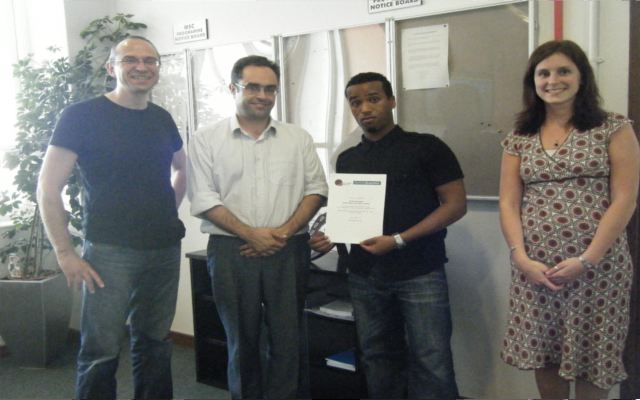
(From left to right): Guglielo Volpe,
George Kapetanios (Head of School),
Mohamed Ismail (winner!),
Sarah Riley (Student Support Manager)
In answering the question how does a degree in economics prepare you for life, I think it is important to firstly look at what is economics? When I first started studying economics at university a friend of mine asked “What is economics all about?” Within a seconds I regurgitated words already familiar to me “Economics is the study of scarcity in a world of finite resources and infinite wants” He looked puzzled, he pressed me again “I don’t get that”. “What is economics about?” I paused to ponder, then eureka! I burst out “Everything” Economics is about everything. He stood there even more puzzled, unable to comprehend the cause my sudden burst of excitement.
From the outside economics is a bit of an enigma a fusion of arts and science. Economics is not only a social science but a genuine science. As Edward Lazear explained, like the physical sciences economics uses a methodology that produces refutable implications and tests these implications using solid statistical techniques. The success of economics derives from its rigor and relevance as well as from its generality.
I think economics is essentially a set of tools rather than a subject. What tools you ask? Why, theoretical and empirical methodology of course. Theoretical methodology looks at modelling real world situations; they assume maximising rational consumers as well as equilibrium a state where all forces are balanced and efficiency. Whilst empirical methodology aims to assess information and data to determine the effects of any single variable. Using these economic tools we can address a multitude of problems from a wide range of topics. Everything from second hand car markets to international monetary policy.
What I was trying explain to my friend was economics plays a role in our everyday lives. We make decisions and choices about what to have for lunch, what time to get up in the morning, and even writing this very essay is a choice which can essentially be analysed with the use of economic tools. We are all economic agents and the decisions we make involve us having to weigh up our perceived costs and benefits given our constraints, whilst at the same time trying to maximise our overall satisfaction. Therefore all decisions we make involve basic economic intuition and reasoning. All decisions? Well OK, maybe not all, some decisions are spur of the moment and involve minimal brain activity, like deciding to jump in the local river on a cold January afternoon to celebrate the end of your exams. This is what we economists like to call irrational behaviour no matter how enjoyable it is. Nonetheless in most decisions we make we are using economics whether you realise it or not.
I have learnt that economic tools, like plasticine, can be moulded and shaped to fit any situation.
Studying economics has taught me to think analytically, in addition economics encompasses several other disciplines such as math, history, geography, politics and philosophy. Thus allowing me to have a more informed perspective on various topics and issues. I have learnt that economic tools like plasticine can be moulded and shaped to fit any situation. From the daily commute for instance, with passengers crowding around train doors not giving space, which I think can be analysed using game theory (a thought that occurred to me whilst being squashed like a sardine one morning). Here each individual player has two options or strategies either to give space or not, with the reward or punishment of getting a seat and not getting a seat respectively. To trying to explain love and having a crush on someone using the concept of asymmetric information.
Critics may claim economics relies greatly on highly simplified models, unrealistic assumptions and fails to explain real world outcomes sufficiently, this may be true to some extent. However do not forget that economics is a relatively new subject in comparison to the traditional sciences. Given time and with progress the intrinsically dynamic nature of economics will ensure that it will continue to go from strength to strength.
In conclusion, studying for a degree in economics, I believe equips you with the tools necessary to analyse and dissect day to day life helping you see clearly and critically when at first things may not appear so clear cut. The allure of economics is that it is highly applicable, relevant and integral to the world we live in, students will undoubtedly benefit from applying economic tools and rationale to all characteristics of life